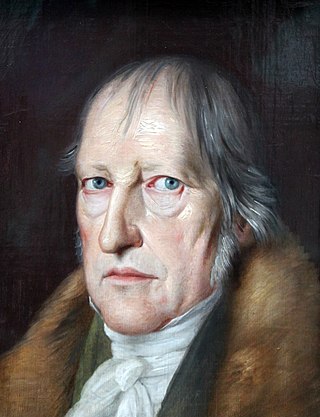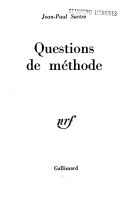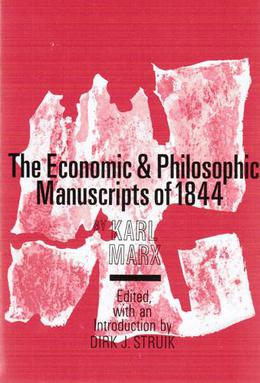Further reading
- Marx's immediate analysis of the unrest in France, 1848-1850
- 18th Brumaire of Louis Napoleon, Marx, 1852
- The civil war in France, Marx, 1871
Universal class is a category derived from the philosophy of Hegel, redefined and popularized by Karl Marx. In Marxism it denotes that class of people within a stratified society for which, at a given point in history, self-interested action coincides with the needs of humanity as a whole.
Hegel believed that history was a movement tending towards the realization of "freedom" (although there is much debate over precisely what Hegel means by freedom) – which, in his own historical moment, he had held his own society to represent, or at least represent the beginning of. For Hegel, divisions and conflicts between people were the external appearance of the internal tensions which drive the development of Spirit. Conflict and its resolution were the ratchet by which human progress was driven steadily forwards – he once famously described Napoleon Bonaparte as "the World Spirit on horseback". Accordingly: having arrived at the end of history, these divisions were to be reconciled by the new "universal class" of state bureaucrats, who acted at all times to reconcile conflicts of interest and acted only in the best interests of the entire society. He also believed in the universal class as an end product.

Georg Wilhelm Friedrich Hegel was a German philosopher and one of the most influential figures of German idealism and 19th-century philosophy. His influence extends across the entire range of contemporary philosophical topics, from metaphysical issues in epistemology and ontology, to political philosophy, the philosophy of history, philosophy of art, philosophy of religion, and the history of philosophy.
Historicism is an approach to explaining the existence of phenomena, especially social and cultural practices, by studying their history, that is, by studying the process by which they came about. The term is widely used in philosophy, anthropology, and sociology.

German philosophy, meaning philosophy in the German language or philosophy by German people, in its diversity, is fundamental for both the analytic and continental traditions. It covers figures such as Gottfried Wilhelm Leibniz, Immanuel Kant, Georg Wilhelm Friedrich Hegel, Karl Marx, Friedrich Nietzsche, Martin Heidegger, Ludwig Wittgenstein, the Vienna Circle, and the Frankfurt School, who now count among the most famous and studied philosophers of all time. They are central to major philosophical movements such as rationalism, German idealism, Romanticism, dialectical materialism, existentialism, phenomenology, hermeneutics, logical positivism, and critical theory. The Danish philosopher Søren Kierkegaard is often also included in surveys of German philosophy due to his extensive engagement with German thinkers.

Karl Marx's theory of alienation describes the experience of human life as meaningless or the human self as worthless in modern capitalist society. It is Marx’s earliest recognizable attempt at a systematic explanatory theory of capitalism.
Philosophy of history is the philosophical study of history and its discipline. The term was coined by the French philosopher Voltaire.

The Open Society and Its Enemies is a work on political philosophy by the philosopher Karl Popper, in which the author presents a "defence of the open society against its enemies", and offers a critique of theories of teleological historicism, according to which history unfolds inexorably according to universal laws. Popper indicts Plato, Hegel, and Marx for relying on historicism to underpin their political philosophies.

Count August Dołęga Cieszkowski was a Polish philosopher, economist and social and political activist. His Hegelian philosophy influenced the young Karl Marx and action theorists.

Bonapartism is the political ideology supervening from Napoleon Bonaparte and his followers and successors. The term was used to refer to people who hoped to restore the House of Bonaparte and its style of government. In this sense, a Bonapartiste was a person who either actively participated in or advocated for conservative, monarchist and imperial political factions in 19th-century France.

Influences on Karl Marx are generally thought to have been derived from three main sources, namely German idealist philosophy, French socialism and English and Scottish political economy.

The lord–bondsman dialectic is a famous passage in Georg Wilhelm Friedrich Hegel's Phenomenology of Spirit. It is widely considered a key element in Hegel's philosophical system, and it has heavily influenced many subsequent philosophers.
Karl Marx's idea that the state can be divided into three subject areas: pre-capitalist states, states in the capitalist era and the state in post-capitalist society. Overlaying this is the fact that his own ideas about the state changed as he grew older, differing in his early pre-communist phase, the young Marx phase which predates the unsuccessful 1848 uprisings in Europe and in his later work.

Search for a Method or The Problem of Method is a 1957 essay by the philosopher Jean-Paul Sartre, in which the author attempts to reconcile Marxism with existentialism. The first version of the essay was published in the Polish journal Twórczość; an adapted version appeared later that year in Les Temps modernes, and later served as an introduction for Sartre's Critique of Dialectical Reason. Sartre argues that existentialism and Marxism are compatible, even complementary, even though Marxism's materialism and determinism might seem to contradict the abstraction and radical freedom of existentialism.
Marxist humanism is an international body of thought and political action rooted in a humanist interpretation of the works of Karl Marx. It is an investigation into "what human nature consists of and what sort of society would be most conducive to human thriving" from a critical perspective rooted in Marxist philosophy. Marxist humanists argue that Marx himself was concerned with investigating similar questions.
Classical Marxism is the body of economic, philosophical, and sociological theories expounded by Karl Marx and Friedrich Engels in their works, as contrasted with orthodox Marxism, Marxism–Leninism, and autonomist Marxism which emerged after their deaths. The core concepts of classical Marxism include alienation, base and superstructure, class consciousness, class struggle, exploitation, historical materialism, ideology, revolution; and the forces, means, modes, and relations of production. Marx's political praxis, including his attempt to organize a professional revolutionary body in the First International, often served as an area of debate for subsequent theorists.

The Economic and Philosophic Manuscripts of 1844, also known as the Paris Manuscripts or the 1844 Manuscripts, are a series of notes written between April and August 1844 by Karl Marx. They were compiled and published posthumously in 1932 by the Soviet Union's Marx–Engels–Lenin Institute. They were first published in their original German in Berlin, and there followed a republication in the Soviet Union in 1933, also in German.

The Eighteenth Brumaire of Louis Napoleon is an essay written by Karl Marx between December 1851 and March 1852, and originally published in 1852 in Die Revolution, a German monthly magazine published in New York City by Marxist Joseph Weydemeyer. Later English editions, such as the 1869 Hamburg edition with a preface by Marx, were entitled The Eighteenth Brumaire of Louis Bonaparte. The essay serves as a major historiographic application of Marx's "materialist conception of history".

In political science, the term class conflict identifies the political tension and economic antagonism that exist among the social classes of society, because of socioeconomic competition for resources among the social classes, between the rich and the poor. In the political and economic philosophies of Karl Marx and Mikhail Bakunin, class struggle is a central tenet and a practical means for effecting radical sociopolitical changes for the social majority, the working class.

The Young Hegelians, or Left Hegelians (Linkshegelianer), or the Hegelian Left, were a group of German intellectuals who, in the decade or so after the death of Georg Wilhelm Friedrich Hegel in 1831, reacted to and wrote about his ambiguous legacy. The Young Hegelians drew on his idea that the purpose and promise of history was the total negation of everything conducive to restricting freedom and reason; and they proceeded to mount radical critiques, first of religion and then of the Prussian political system. They rejected anti-utopian aspects of his thought that "Old Hegelians" have interpreted to mean that the world has already essentially reached perfection.
Marxist philosophy or Marxist theory are works in philosophy that are strongly influenced by Karl Marx's materialist approach to theory, or works written by Marxists. Marxist philosophy may be broadly divided into Western Marxism, which drew from various sources, and the official philosophy in the Soviet Union, which enforced a rigid reading of Marx called dialectical materialism, in particular during the 1930s. Marxist philosophy is not a strictly defined sub-field of philosophy, because the diverse influence of Marxist theory has extended into fields as varied as aesthetics, ethics, ontology, epistemology, social philosophy, political philosophy, the philosophy of science, and the philosophy of history. The key characteristics of Marxism in philosophy are its materialism and its commitment to political practice as the end goal of all thought. The theory is also about the struggles of the proletariat and their reprimand of the bourgeoisie.
Historical materialism is Karl Marx's theory of history. Marx locates historical change in the rise of class societies and the way humans labor together to make their livelihoods. For Marx and his lifetime collaborator, Friedrich Engels, the ultimate cause and moving power of historical events are to be found in the economic development of society and the social and political upheavals wrought by changes to the mode of production. It provides a challenge to the view that historical processes have come to a close and that capitalism is the end of history. Although Marx never brought together a formal or comprehensive description of historical materialism in one published work, his key ideas are woven into a variety of works from the 1840s onward. Since Marx's time, the theory has been modified and expanded. It now has many Marxist and non-Marxist variants.